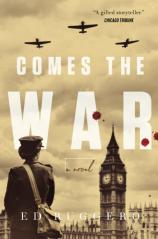Comes the War
Review
Comes the War
Historical fiction is as old as Gilgamesh, I suppose, and detective fiction is as old as Wilkie Collins. But historical detective fiction dates back to the era of shoulder pads and leg warmers, when some enterprising authors hit upon the idea that standard mystery plots could be superimposed on medieval abbeys and Roman villas. It continues to chug along, and COMES THE WAR is one of several recent historical mysteries that focus on the era of the Second World War.
The historical mystery is a fusionist genre --- and like fusionist cuisine, like spam musubi, you have to kind of be in the mood for it. (There was a short-lived Mexican-Indian restaurant where I live in Central New Jersey, and you really, really had to be in the mood for that kind of thing.) And like fusionist cuisine, historical mystery is all about balance. You can’t let the historical elements outweigh the mystery, or vice versa.
"COMES THE WAR is a perfectly adequate and satisfying police procedural, and if you’re not asking for much more than that, you won’t be disappointed."
COMES THE WAR initially comes on like gangbusters, with a promising cold open. A female American economist working for the OSS is found in a London alley with her throat slashed, and an American MP and the London police are contesting jurisdiction. A suspect is found incoherently drunk in a local pub, and he just so happens to be tied into the intrigue involving the upcoming D-Day invasion. All the pieces are there for author Ed Ruggero to put them together, but he doesn’t quite achieve that.
One of the choices you have to make in historical mysteries is to have either fictional characters or fictionalized versions of real characters. Ruggero goes with the former approach, which is probably the best way to go, but his characters are curiously flat. The lead, ex-Philadelphia cop Eddie Harkins, is a mouthy version of Joe Friday --- just-the-facts with a bit of backtalk. He’s accompanied by a mousy female driver from the motor pool, and the two pinball around wartime London, dodging piles of debris left over from the Blitz.
The difficulty with the just-the-facts approach results in a book that is overly talky and not in any way evocative. COMES THE WAR covers the themes of 1944 London --- privation, rationing, dread of the unknowns regarding the coming invasion of Fortress Europe --- without ever giving the reader a sense of the time and place.
Ruggero does work to inject a little energy into the book, once by having Harkins witness the fatal crash of a long-range bomber at an English airfield, and once by inexplicably re-routing Harkins on a training mission that ends in tragedy. These side trips are helpful for reminding Harkins, and the reader, of the stakes involved in the war, but don’t do much to move the story forward. Harkins' strong suit is interrogating people, but this makes for a very talky book. The characters go from one interrogation to another, endlessly chasing down false and confusing leads.
COMES THE WAR is a perfectly adequate and satisfying police procedural, and if you’re not asking for much more than that, you won’t be disappointed. But there is so much promise in this particular historical setting, and so many opportunities for the stolid American cop to run into characters who are interesting, or at least eccentric. All of the elements are there; they are just not delivered in the right way.
Reviewed by Curtis Edmonds on February 26, 2021
Comes the War
- Publication Date: March 29, 2022
- Genres: Fiction, Historical Fiction, Historical Thriller, Suspense, Thriller
- Paperback: 288 pages
- Publisher: Forge Books
- ISBN-10: 1250312906
- ISBN-13: 9781250312907




